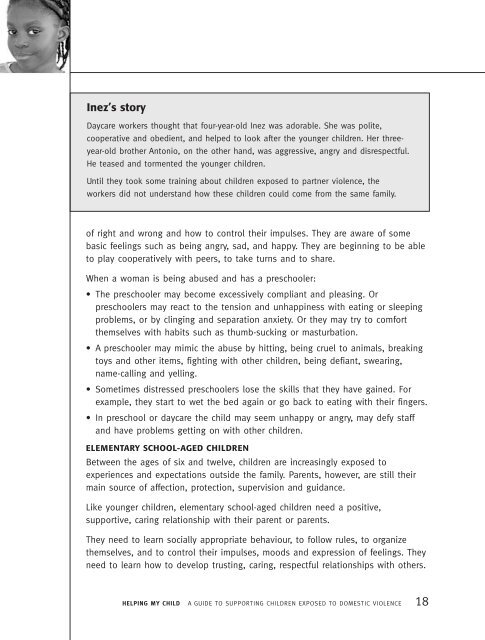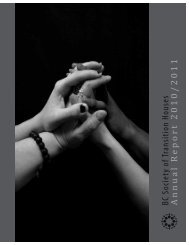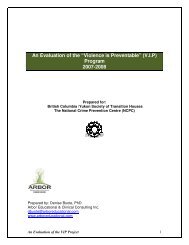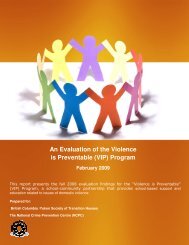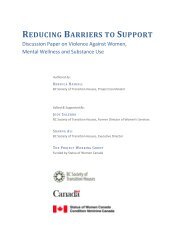a guide to supporting children exposed to domestic violence
a guide to supporting children exposed to domestic violence
a guide to supporting children exposed to domestic violence
Create successful ePaper yourself
Turn your PDF publications into a flip-book with our unique Google optimized e-Paper software.
Inez’s s<strong>to</strong>ry<br />
Daycare workers thought that four-year-old Inez was adorable. She was polite,<br />
cooperative and obedient, and helped <strong>to</strong> look after the younger <strong>children</strong>. Her threeyear-old<br />
brother An<strong>to</strong>nio, on the other hand, was aggressive, angry and disrespectful.<br />
He teased and <strong>to</strong>rmented the younger <strong>children</strong>.<br />
Until they <strong>to</strong>ok some training about <strong>children</strong> <strong>exposed</strong> <strong>to</strong> partner <strong>violence</strong>, the<br />
workers did not understand how these <strong>children</strong> could come from the same family.<br />
of right and wrong and how <strong>to</strong> control their impulses. They are aware of some<br />
basic feelings such as being angry, sad, and happy. They are beginning <strong>to</strong> be able<br />
<strong>to</strong> play cooperatively with peers, <strong>to</strong> take turns and <strong>to</strong> share.<br />
When a woman is being abused and has a preschooler:<br />
• The preschooler may become excessively compliant and pleasing. Or<br />
preschoolers may react <strong>to</strong> the tension and unhappiness with eating or sleeping<br />
problems, or by clinging and separation anxiety. Or they may try <strong>to</strong> comfort<br />
themselves with habits such as thumb-sucking or masturbation.<br />
• A preschooler may mimic the abuse by hitting, being cruel <strong>to</strong> animals, breaking<br />
<strong>to</strong>ys and other items, fighting with other <strong>children</strong>, being defiant, swearing,<br />
name-calling and yelling.<br />
• Sometimes distressed preschoolers lose the skills that they have gained. For<br />
example, they start <strong>to</strong> wet the bed again or go back <strong>to</strong> eating with their fingers.<br />
• In preschool or daycare the child may seem unhappy or angry, may defy staff<br />
and have problems getting on with other <strong>children</strong>.<br />
ELEMENTARY SCHOOL-AGED CHILDREN<br />
Between the ages of six and twelve, <strong>children</strong> are increasingly <strong>exposed</strong> <strong>to</strong><br />
experiences and expectations outside the family. Parents, however, are still their<br />
main source of affection, protection, supervision and guidance.<br />
Like younger <strong>children</strong>, elementary school-aged <strong>children</strong> need a positive,<br />
supportive, caring relationship with their parent or parents.<br />
They need <strong>to</strong> learn socially appropriate behaviour, <strong>to</strong> follow rules, <strong>to</strong> organize<br />
themselves, and <strong>to</strong> control their impulses, moods and expression of feelings. They<br />
need <strong>to</strong> learn how <strong>to</strong> develop trusting, caring, respectful relationships with others.<br />
HELPING MY CHILD A GUIDE TO SUPPORTING CHILDREN EXPOSED TO DOMESTIC VIOLENCE 18


